- Home
- Elif Shafak
The Forty Rules of Love Page 9
The Forty Rules of Love Read online
Page 9
The worst by far is to work in the kitchen under the supervision of the cook. The man has a stone instead of a heart. He could have been a bloodthirsty commander in the Mongol army rather than a cook in a dervish lodge. I can’t recall ever hearing him say anything nice to anyone. I don’t think he even knows how to smile.
Once I asked a senior dervish if all the novices had to go through the trial of working with the cook in the kitchen. He smiled mysteriously and replied, “Not all novices, only some.”
Then why me? Why does the master want me to suffer more than the other novices? Is it because my nafs is bigger than theirs and needs harsher treatment to be disciplined?
Every day I am the first to wake up, to get water from the nearby creek. I then heat up the stove and bake the flat sesame bread. Preparing the soup to be served at breakfast is also my responsibility. It is not easy to feed fifty people. Everything needs to be cooked in cauldrons that are no smaller than bathtubs. And guess who scrubs and washes them afterward? From dawn to dusk, I mop the floors, clean the surfaces, wipe the stairs, sweep the courtyard, chop wood, and spend hours on my hands and knees to scrub the creaky old floorboards. I prepare marmalades and spicy relishes. I pickle carrots and squash, making sure there is just the right amount of salt, enough to float an egg. If I add too much or too little salt, the cook throws a fit and breaks all the jars, and I have to make everything anew.
To top it all off, I am expected to recite prayers in Arabic as I perform each and every task. The cook wants me to pray aloud so that he can check whether I skip or mispronounce a word. So I pray and work, work and pray. “The better you bear the hardships in the kitchen, the faster you will mature, son,” my tormentor claims. “While you learn to cook, your soul will simmer.”
“But how long is this trial going to last?” I asked him once.
“A thousand and one days” was his answer. “If Scheherazade the storyteller managed to come up with a new tale every night for that long, you, too, can endure.”
This is crazy! Do I resemble in the least bit that loudmouthed Scheherazade? Besides, all she did was lie on velvet cushions twiddling her toes and make up fancy stories while she fed the cruel prince sweet grapes and figments of her imagination. I don’t see any hard work there. She wouldn’t have survived a week if she were asked to accomplish half of my work. I don’t know if anyone is counting. But I surely am. And I have 624 more days to go.
The first forty days of my trial I spent in a cell so small and low that I could neither lie down nor stand up and had to sit on my knees all the time. If I longed for proper food or some comfort, was scared of the dark or the loneliness, or God forbid had wet dreams about a woman’s body, I was ordered to ring the silver bells dangling from the ceiling for spiritual help. I never did. This is not to say I never had any distracting thoughts. But what’s wrong with having a few distractions when you can’t even move?
When the seclusion period was over, I was sent back to the kitchen to suffer at the hands of the cook. And suffer I did. But the truth is, as bitter as I might be toward him, I never broke the cook’s rules—that is, until the evening Shams of Tabriz arrived. That night, when the cook finally caught up with me, he gave me the worst beating of my life, breaking willow stick after willow stick on my back. Then he put my shoes in front of the door, with their fronts pointing out, to make it clear it was time for me to leave. In a dervish lodge, they never kick you out or tell you openly that you have failed; instead they make you silently leave.
“We cannot make you a dervish against your will,” the cook announced. “A man can bring a donkey to the water but cannot make him drink. The donkey should have it in him. There’s no other way.”
That makes me the donkey, of course. Frankly, I would have left this place a long time ago had it not been for Shams of Tabriz. My curiosity about him kept me anchored here. I had never met anyone like him before. He feared no one and obeyed no one. Even the cook respected him. If there ever were a role model for me in this lodge, it was Shams with his charm, dignity, and unruliness. Not the humble old master.
Yes, Shams of Tabriz was my hero. After seeing him, I decided I didn’t need to turn myself into a meek dervish. If I spent enough time next to him, I could become just as brash, steadfast, and rebellious. So when autumn came and I realized that Shams was leaving for good, I decided to leave with him.
Having made up my mind, I went to see Baba Zaman and found him sitting, reading an old book by the light of an oil lamp.
“What do you want, novice?” he asked wearily, as if seeing me tired him.
As forthright as I could be, I said, “I understand that Shams of Tabriz is leaving soon, Master. I want to go with him. He might need company on the way.”
“I didn’t know you cared for him so much,” the master said suspiciously. “Or is it because you are looking for ways to avoid your tasks in the kitchen? Your trial is not over yet. You can hardly be called a dervish.”
“Perhaps going on a journey with someone like Shams is my trial,” I suggested, knowing that it was a bold thing to say but saying it anyhow.
The master lowered his gaze, lapsing into contemplation. The longer his silence, the more I was convinced he would scold me for my insolence and call the cook to keep a better eye on me. But he did no such thing. Instead he looked at me forlornly and shook his head.
“Perhaps you were not created for life in a lodge, my son. After all, out of every seven novices that set out on this path, only one remains. My feeling is you are not fit to be a dervish and need to look for your kismet elsewhere. As for accompanying Shams on his journey, you will have to ask him about that.”
Thus giving me notice, Baba Zaman closed the subject with a polite but dogged gesture of his head and went back to his book.
I felt sad and small, but strangely liberated.
Shams
BAGHDAD, SEPTEMBER 30, 1243
Battling the winds, my horse and I sped away at the crack of dawn. Only once did I stop to look back. The dervish lodge resembled a bird’s nest hidden among mulberry trees and shrubs. For a while Baba Zaman’s weary face kept flickering across my mind. I knew he was concerned about me. But I saw no real reason for that. I had embarked on an inner journey of Love. How could any harm come out of that? It was my tenth rule: East, west, south, or north makes little difference. No matter what your destination, just be sure to make every journey a journey within. If you travel within, you’ll travel the whole wide world and beyond.
Though I anticipated hardships ahead, that didn’t worry me much. Whatever fate awaited me in Konya, I welcomed it. As a Sufi, I had been trained to accept the thorn with the rose, the difficulties with the beauties of life. Hence followed another rule: The midwife knows that when there is no pain, the way for the baby cannot be opened and the mother cannot give birth. Likewise, for a new Self to be born, hardship is necessary.
Just as clay needs to go through intense heat to become strong, Love can only be perfected in pain.
The night before I left the dervish lodge, I opened all the windows in my room to let the sounds and the smells of the darkness waft in. By the flickering light of a candle, I cut my long hair. Thick clusters of it fell to the floor. I then shaved my beard and mustache and got rid of my eyebrows. When done, I inspected the face in the mirror, now brighter and younger. Without any hair my face was cleared of a name, age, or gender. It had no past or future, sealed forever in this moment.
“Your journey is already changing you,” said the master when I went to his room to say good-bye. “And it hasn’t even started yet.”
“Yes, I realized,” I said softly. “It is another one of the forty rules: The quest for Love changes us. There is no seeker among those who search for Love who has not matured on the way. The moment you start looking for Love, you start to change within and without.”
With a slight smile, Baba Zaman took out a velvet box and handed it to me. Inside, I found three things: a silver mirror, a silk handkerchief
, and a glass flask of ointment.
“These items will help you on your journey. Use them when need be. If you ever lose self-esteem, the mirror will show your inner beauty. In case your reputation is stained, the handkerchief will remind you of how pure your heart is. As for the balm, it will heal your wounds, both inside and outside.”
I caressed each object, closed the box, and thanked Baba Zaman. Then there was nothing else to say.
As the birds chirped and tiny dewdrops hung from the branches with the first light of the morning, I mounted my horse. I set off toward Konya, not knowing what to expect but trusting the destiny that the Almighty had prepared for me.
The Novice
BAGHDAD, SEPTEMBER 30, 1243
Behind Shams of Tabriz, I rode my stolen horse. Hard as I tried to keep a safe distance between us, it soon proved impossible to trail him without making myself apparent. When Shams stopped at a bazaar in Baghdad to refresh himself and buy a few things for the road, I decided to make myself known and threw myself in front of his horse.
“Ginger-haired ignoramus, what are you doing there lying on the ground?” Shams exclaimed from his horse, looking half amused, half surprised.
I knelt, clasped my hands, and craned my neck, as I had seen beggars do, and implored, “I want to come with you. Please let me join you.”
“Do you have any idea where I am going?”
I paused. That question had never occurred to me. “No, but it makes no difference. I want to become your disciple. You are my role model.”
“I always travel alone and want no disciples or students, thank you! And I am certainly no role model for anyone, much less for you,” Shams said. “So just go on your way. But if you are still going to look for a master in the future, please keep in mind a golden rule: There are more fake gurus and false teachers in this world than the number of stars in the visible universe. Don’t confuse power-driven, self-centered people with true mentors. A genuine spiritual master will not direct your attention to himself or herself and will not expect absolute obedience or utter admiration from you, but instead will help you to appreciate and admire your inner self. True mentors are as transparent as glass. They let the Light of God pass through them.”
“Please give me a chance,” I implored. “All the famous travelers had someone to assist them on the road, like an apprentice or something.”
Shams scratched his chin pensively, as if acknowledging the truth in my words. “Do you have the strength to bear my company?” he inquired.
I jumped to my feet, nodding with all my heart: “I certainly do. And my strength comes from within.”
“Very well, then. Here is your first task: I want you to go to the nearest tavern and get yourself a pitcher of wine. You will drink it here in the bazaar.”
Now, I was used to scrubbing the floors with my robes, polishing pots and pans till they sparkled like the fine Venetian glass I had seen in the hands of an artisan who had escaped from Constantinople long ago when the Crusaders had sacked the city. I could chop a hundred onions in one sitting or peel and mince cloves of garlic, all in the name of spiritual development. But drinking wine in the midst of a crowded bazaar to that end was beyond my ken. I looked at him in horror.
“I cannot do that. If my father learns, he’ll break my legs. He sent me to the dervish lodge so that I could become a better Muslim, not a heathen. What will my family and friends think of me?”
I felt the burning glare of Shams on me and shivered under the pressure, just like the day I had spied on him behind closed doors.
“You see, you cannot be my disciple,” he pronounced with conviction. “You are too timid for me. You care too much about what other people think. But you know what? Because you are so desperate to win the approval of others, you’ll never get rid of their criticisms, no matter how hard you try.”
I realized that my chance to accompany him was slipping away and rushed in to defend myself. “How was I to know you were not asking that question on purpose? Wine is strictly forbidden by Islam. I thought you were testing me.”
“But that would be playing God. It is not up to us to judge and measure each other’s devoutness,” Shams answered.
I looked around in despair, not knowing what to make of his words, my mind pounded like dumpling dough.
Shams went on: “You say you want to travel the path, but you don’t want to sacrifice anything to that end. Money, fame, power, lavishness, or carnal pleasure—whatever it is that one holds most dear in life, one should dispose of that first.”
Patting his horse, Shams concluded with an air of finality, “I think you ought to stay in Baghdad with your family. Find an honest tradesman and become his apprentice. I have a feeling you might make a good merchant someday. But don’t be a greedy one! Now, with your permission, I need to get going.”
With that, he saluted me one last time, kicked his horse, and galloped away, the world sliding under its thundering hoofs. I hopped onto my horse and chased him toward the outskirts of Baghdad, but the distance between us got greater and greater until he was no more than a dark spot in the distance. Even long after that spot had disappeared on the horizon, I could feel the weight of Shams’s stare on me.
Ella
NORTHAMPTON, MAY 24, 2008
Breakfast is the most important meal of the day. Being a big believer of this saying, every morning, weekdays and weekends alike, Ella made her way to the kitchen. A good breakfast, she thought, set the tone for the rest of the day. She had read in women’s magazines that families who regularly had a proper breakfast together were more cohesive and harmonious than those in which each member rushed out the door half hungry. And though she firmly believed in this research, she had yet to experience the joyful breakfast the magazines wrote about. Her breakfast experience was a collision of galaxies where every member of her family marched to a different drummer. Everyone wanted to eat a different thing at breakfast, which was entirely against Ella’s notion of eating together. How could there be unity at a table when one nibbled toasted bread and jam (Jeannette) while another chomped honey-puffed cereal (Avi) and a third waited patiently to be served scrambled eggs (David) and a fourth refused to eat anything at all (Orly)? All the same, breakfast was important. Every morning she prepared it, determined that no child of hers would begin the day munching on candy or some other junk food.
But this morning when she entered the kitchen, instead of brewing coffee, squeezing oranges, or toasting bread, the first thing Ella did was to sit at the kitchen table and turn on her laptop. She logged on to the Internet to see whether there was an e-mail from Aziz. To her delight, there was.
Dear Ella,
I was so happy to learn that things have improved between you and your daughter. As for me, I left the village of Momostenango yesterday at the crack of dawn. Strange, I stayed here only a few days, and yet when the time came to bid farewell, I felt sad, almost grieved. Would I ever see this tiny village in Guatemala again? I didn’t think so.
Each time I say good-bye to a place I like, I feel like I am leaving a part of me behind. I guess whether we choose to travel as much as Marco Polo did or stay in the same spot from cradle to grave, life is a sequence of births and deaths. Moments are born and moments die. For new experiences to come to light, old ones need to wither away. Don’t you think?
While in Momostenango, I meditated and tried to visualize your aura. Before long, three colors came to me: warm yellow, timid orange, and reserved metallic purple. I had a feeling these were your colors. I thought they were beautiful both separately and together.
My final stop in Guatemala is Chajul—a small town with adobe houses and children with eyes wise beyond their years. In each house, women of all ages weave magnificent tapestries. I asked a granny to choose a tapestry and said it was for a lady living in Northampton. After giving it some thought, she pulled a tapestry from a huge pile behind her. I swear to God, there were more than fifty tapestries of every possible color in that pile. Yet the one she
chose for you was composed of only three tones: yellow, orange, and purple. I thought you might like to know about this coincidence, if there is such a thing in God’s universe.
Does it ever occur to you that our exchange might not be a result of coincidence?
Warm regards,
Aziz
P.S. If you want, I can send you your tapestry via mail, or I can wait till the day we meet for coffee and bring it myself.
Ella closed her eyes and tried to imagine how the colors of her aura surrounded her face. Interestingly, the image of herself that popped up in her mind was not her grown-up self but her as a child, around seven years of age.
Many things came flooding back to her, memories that she thought she had long left behind. The sight of her mother standing still with a pistachio green apron around her waist and a measuring cup in her hand, her face an ashen mask of pain; dangling paper hearts on the walls, bright and sparkly; and the body of her father hanging from the ceiling as if he wanted to blend with the Christmas decorations and give the house a festive look. She remembered how she had spent her teenage years holding her mother responsible for the suicide of her father. As a young girl, Ella had promised herself that when she got married, she would always make her husband happy and not fail in her marriage, like her mother. In her endeavor to make her marriage as different from her mother’s as possible, she had not married a Christian man, preferring to marry inside her faith.

 Black Milk: On Writing, Motherhood, and the Harem Within
Black Milk: On Writing, Motherhood, and the Harem Within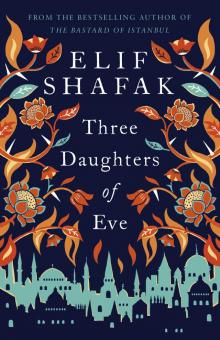 Three Daughters of Eve
Three Daughters of Eve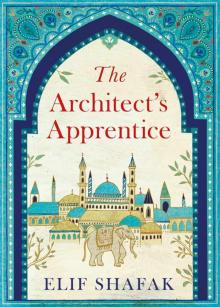 The Architect's Apprentice
The Architect's Apprentice The Gaze
The Gaze The Flea Palace
The Flea Palace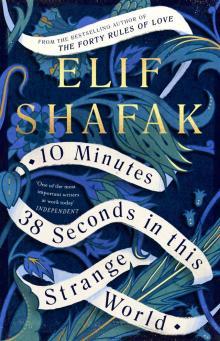 10 Minutes 38 Seconds in this Strange World
10 Minutes 38 Seconds in this Strange World The Forty Rules of Love
The Forty Rules of Love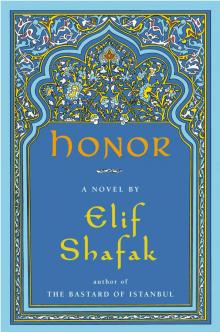 Honor
Honor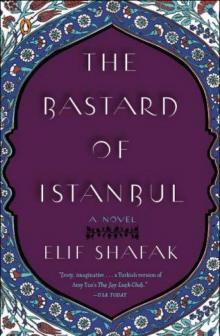 The Bastard of Istanbul
The Bastard of Istanbul Black Milk
Black Milk The Happiness of Blond People (Penguin Specials)
The Happiness of Blond People (Penguin Specials)